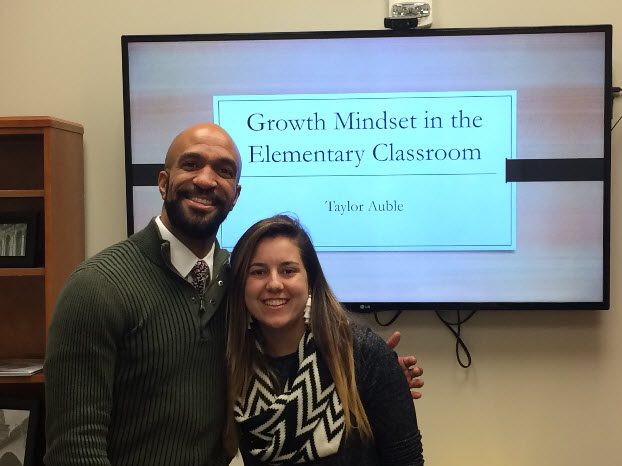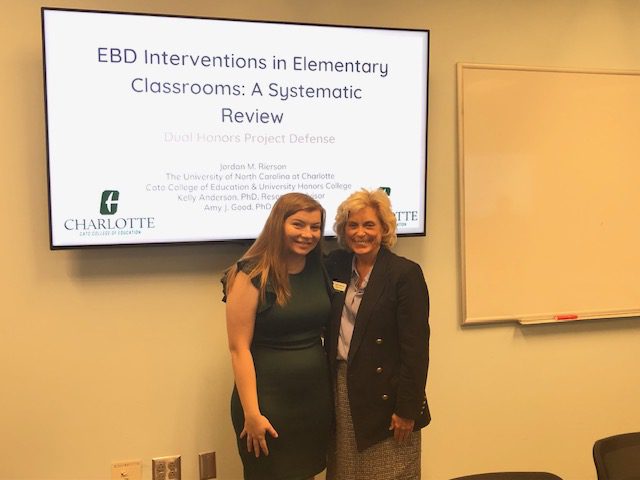Information for Academic Advisors, Mentors, and Readers

Nominating Academic Advisor and/or Faculty Member:
All students who meet the minimum GPA requirement will receive an email invitation to apply to the Education Honors Program. Students must complete the online application to officially enroll in the program.
The application requires digital approval from an Academic advisor or Nominating Faculty member, which means that he/she confirms the following:
- That the student has talked with their academic advisor/faculty member about choosing a research advisor (i.e., Honors Mentor)
- That the student has enough time remaining in their program of study to complete the three 3-credit Honors courses before they begin student teaching. We also recommend that the nominating member and the student review the Education Honors handbook.
- Note: UNC Charlotte has a fixed tuition program (https://ninercentral.charlotte.edu/billing-payments-refunds/tuition-and-fees/fixed-tuition-program) that locks tuition for eight consecutive semesters for FTIC freshmen. Transfer students are given a prorated number of locked semesters depending on their expected time to graduation upon transfer. For the 9th semester, tuition will increase to the current rate for new students.
- The academic advisor/faculty member should verify that the student meets the 3.0 or higher cumulative GPA criterion. (NOTE: If a promising student does not yet meet the GPA requirement, but has the potential for high task commitment, achievement, and/or creativity in any area of study, research, leadership, or service, the Honors Committee will consider the student’s application on a case-by-case basis. The student AND the academic advisor/faculty member should explain how the student will be able to handle the rigors of the Education Honors Program in the application and approval forms.)
- Item #4 applies to entering students in Fall of 2024. Current students may petition to have this GPA requirement applied to their application.
Nominating Academic Advisors and/or Faculty Members must complete the online nomination application here.
Research Advisors and Readers:
THANK YOU for your consideration in mentoring a student in the Cato College of Education Honors Program! We appreciate your support, mentorship, time, and interest in being a thesis advisor for an honors student!
Both you and your mentee will benefit in multiple ways from participating in this program.
- First, mentors and mentees may develop positive and long-lasting professional relationships.
- Second, both you and your mentee can learn from each other. The mentee will gain invaluable knowledge from you to inform their very own research studies, which is an exciting and unique opportunity for them. Mentors may also learn more about the mentee’s topic.
- Third, your support in this project will allow the students to complete their research projects which in turn could open the door to additional opportunities in research, graduate school, and their future careers in education.
Being a mentor is a time commitment that we acknowledge and respect. To make the process as easy as possible, we would like to provide you with helpful information about the program, responsibilities of the mentor, mentee, and seminar instructor, and key dates and major assignments. During your first meeting with the mentee, we request that you discuss the mentee’s potential topic to determine if it is a good fit for you based on your research interests and background.
Here is the link to our handy Education Honors Handbook that includes many helpful details for both mentors and mentees.
Thank you again for your invaluable support and consideration!
Research Advisors:
The Honors Mentor or Research Advisor is responsible for helping students by:
- Reviewing the Education Honors Handbook
- Defining an appropriate topic for their Capstone Research Project (EDUC 3789)
- Selecting relevant literature to read and report (EDUC 3789)
- Setting clear criteria for progress, expectations, report length and contents (EDUC 3789 and final honor’s course)
- Identifying needed resources for the project (EDUC 3789 and final honor’s course)
- Keeping the project on schedule (both in doing it and reporting it; EDUC 3789 and final honor’s course)
- Meeting on a regular basis throughout the project (EDUC 3789 and final honor’s course)
- Reading and commenting on drafts (research paper and IRBIS application) in a timely (not “miracle”) fashion (EDUC 3789 and final honor’s course)
- Assisting the student in locating a reader (EDUC 3789)
- Signing the mentee’s Application for candidacy forms (EDUC 3789 and final honor’s course)
- Scheduling and preparing for the final defense (final honor’s course)
- Assigning a grade to the final project after its completion and after input from the thesis reader. We ask the research advisors to use this rubric to give students feedback and assign them a grade
Readers:
The research advisor often helps candidates select an appropriate external reader. The external reader may be an Honors Faculty member or member of the Education Honors Committee. The external reader should be supportive of the project and have sufficient time to read the written drafts and provide feedback.
The reader is responsible for the following:
- Reading and commenting on students’ proposal and final project drafts (research paper) in a timely (not “miracle”) fashion (EDUC 3789 and final honor’s course)
- Attending the mentee’s honors thesis defense (final course)
- Signing the mentee’s Application for candidacy forms (EDUC 3789 and final honor’s course)
